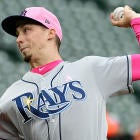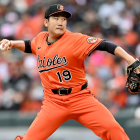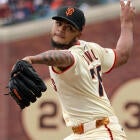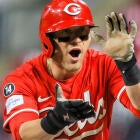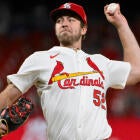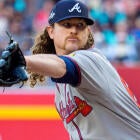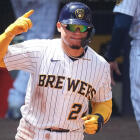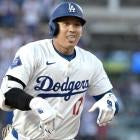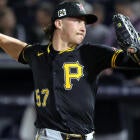More Fantasy Baseball: Dynasty Value Update | Waivers: Trust Nick Pivetta | SportsLine: Top 200 Trade Values Chart | Let's make a trade
It's been a surprisingly good year for pitching. League-wide, of course, scoring is only slightly down — and it's been rising since a literal cold start to the season — but we've still seen a surprising number of breakout pitchers.
That's not unusual, of course. Every season we'll have a handful of hot starts, and one of the keys to winning in Fantasy is figuring out which starts are for real and which will fizzle out.
- Subscribe to the Fantasy Baseball Today podcast for free on Apple Podcasts, Stitcher, TuneIn, Google Play or anywhere else you listen.
So, let's figure it out. Here are 11 starting pitchers off to better-than-expected starts, and my take on which to believe buy, sell or lease — basically, which I want to buy, but with reservations.
Buy it
Whatever the reason — and Trevor Bauer has some theories — the Astros have finally unlocked Gerritt Cole's potential. The biggest change is fairly straightforward: Cole is throwing his fastball less and his breaking pitches more, allowing him to tap into more swing-and-miss potential than ever. It certainly doesn't look like a fluke, as Cole ranks among the league leaders in strikeout and swinging strike rate. This is who he was meant to be.
The more impressive work for the Astros' coaching staff is Charlie Morton, who never had Cole's upside, but has been nearly as impressive. Unlike Cole, Morton still relies heavily on his sinker, but he's also throwing harder than nearly any starter in baseball, while still sporting one of the most devastating curveballs in the game. His breakout began last year, but he's solidifying it in 2018. With the strikeouts and ground balls Morton can generate, the only thing that could hold him back at this point might be injuries.
Bauer is sort of a mix of Cole and Morton in that he's a former top prospect whose 2018 performance is just building on the growth he showed in 2017. The addition of a slider has allowed Bauer to rely on his fastball less than ever, and he now has five pitches for opposing hitters to wrestle with. Bauer is running the highest swinging strike rate of his career, largely thanks to an increase in swing rate on pitches outside of the strike zone to 31.2 percent, his highest since 2014. With a 3.16 ERA and 17 wins over the past 365 days, there aren't many holes left in Bauer's game.
"If Blake Snell can cut his walk rate…"
That was the book on him, and he's managed to pull it off. Easier said than done, of course, but it's always nice to see a pitcher fix the one flaw in his game. He's cut his walk rate from 10.8 to 7.8 percent, while also improving his strikeout rate to a career high. If you're nitpicking, he might allow more fly balls than you'd like, but he also pitches in a good park to minimize that. It's real.
OK, Nick Pivetta gives up too many fly balls. That's about the only thing you can say he isn't doing right so far this season. He ranks in the top 20 in the majors in strikeout rate, while ranking 14th in K-BB%. I know, he was awful last season, but he's also a different pitcher than last season, with a refined changeup and curveball, to the point where the latter is a legitimate weapon. His home park could work against him given his fly-ball tendencies, but he does everything else so well that it's just nitpicking. I expect a mid-3.00s ERA and piles of strikeouts moving forward.
Lease it
And here we get to the point of the column where I say, "I buy it, but…"
I buy Manaea's breakout. His velocity is down this season, but he's getting more movement on it than anyone in baseball, as FanGraphs.com pointed out this week, and he still has two put-away secondary pitches. Manaea will probably never rack up huge strikeout numbers, but he's only a little below league average at 20.9 percent, and he's managed to cut his already solid walk rate to elite levels. No, he's not an ace, but Manaea should be valued as an above-average pitcher moving forward.
I wrote about Corbin earlier this week, and my point was basically this: I believe he will be good, even with diminished fastball velocity over his past three starts. My only question is, does the diminished fastball velocity serve as a sign of impending doom in the form of a latent injury? If not, he'll continue to rack up whiffs thanks to his vicious slider, and should be a strong starting pitcher. How risk-averse you want to be will determine whether he's in the "Buy" or "Lease" category for you.
Sean Newcomb was never quite the prospect Snell was, mostly because he had even worse control problems in the minors. He hasn't quite solved them yet, but he's been absolutely unhittable of late, allowing only five hits over his past three starts combined. Newcomb induces plenty of weak contact — when he's not outright avoiding it — but he's still issuing too many free passes to truly buy into as a must-start pitcher. The highs will be dizzying, but there will be some lows along the way too. Don't give up during the bad times, but don't expect the good times to keep rolling quite the way they have.
Sell it
The 2.72 ERA is nice, but I'm not sure Trevor Williams is even as good as he was a year ago right now. He's getting fewer strikeouts and swings and misses, while walking more batters than he did a year ago, and that's coming along with diminished fastball velocity. I'm not sure anyone is interested in giving you much for Williams, but if you can get anything for him ... do it right now.
Mike Foltynewicz has always had the talent, but the results have never quite been there. That's changed, as his strikeout rate has jumped from squarely below average to well above average, while his 3.42 FIP points to real improvements in his approach. Of course, Foltynewicz is garnering fewer swings and misses than ever, along with a career-low 20.9 percent swing rate on pitches outside of the strike zone — a startlingly low number. The Braves catchers can help to a certain extent there, but this still probably isn't sustainable. Give me Pivetta, Newcomb or Manaea over Foltynewicz, easily.
Well, it turns out Coors Field wasn't the reason Tyler Chatwood could never throw strikes. He still gets plenty of groundballs, and generally does a decent job inducing weak contact, but you just can't survive with an 18.3 percent walk rate. Chatwood's 3.14 ERA screams regression, but you may not yet realize how bad things can get; his 5.62 SIERA is the second-worst in baseball. Abandon ship before it's too late. I wouldn't even mind dropping Chatwood.
![[object Object] Logo](https://sportshub.cbsistatic.com/i/2020/04/22/e9ceb731-8b3f-4c60-98fe-090ab66a2997/screen-shot-2020-04-22-at-11-04-56-am.png)



























